Many job seekers report lengthy and difficult hiring processes that include multiple interviews and complicated assessments. Due to these challenges, some may resort to cheating or lying during the hiring process.
To understand the prevalence of and reasons for cheating in the hiring process, in May, ResumeTemplates.com surveyed 1,759 recent job seekers (those who looked for a job in the past 2 years).
Study highlights:
- 7 in 10 recent job seekers cheated or lied during the hiring process
- 22% cheated on an assessment
- 15% cheated on a phone interview, 13%during an in-person interview, and 11% in a video interview
- 1 in 2 gave a false reference
- 22% lied on their resume
71% of Recent Job Seekers Cheated in the Hiring Process
Among job seekers who engaged in a job search within the past two years, 15% confess to always (5%) or often (10%) cheating during the hiring process, while 20% occasionally do so, and 35% rarely engage in such behaviors. Twenty-nine percent report that they have never cheated during the hiring process.
Job seekers cheated or lied in the hiring process in a variety of ways, which we get into below.
More Than 1 in 10 Assessment Takers Had Someone Else Complete the Test
Of recent job seekers, 22% say they cheated on online assessments. Of these individuals, 71% googled answers when it was not allowed, 37% utilized ChatGPT when it was not allowed, and 33% sought out assistance from others.
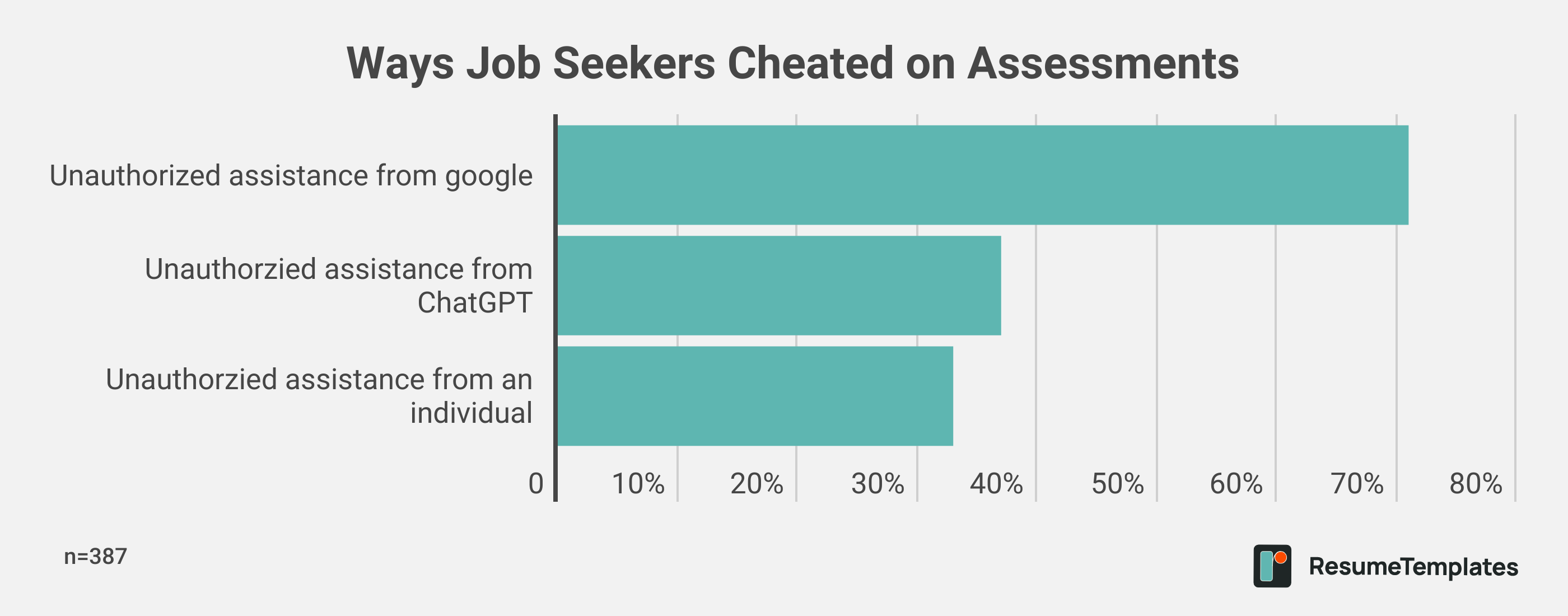
Within the group that received assistance with assessments, 21% admit someone else completed the entire assessment for them, and 47% confess to having someone complete a lot of the assessment. Additionally, 26% report asking someone else to complete some of the assessment, while 10% say they had someone else complete a small amount of the assessment.
Among those who received external help, the most common sources were friends (66%), followed by significant others (40%), mentors (40%), siblings (39%), and parents (28%).
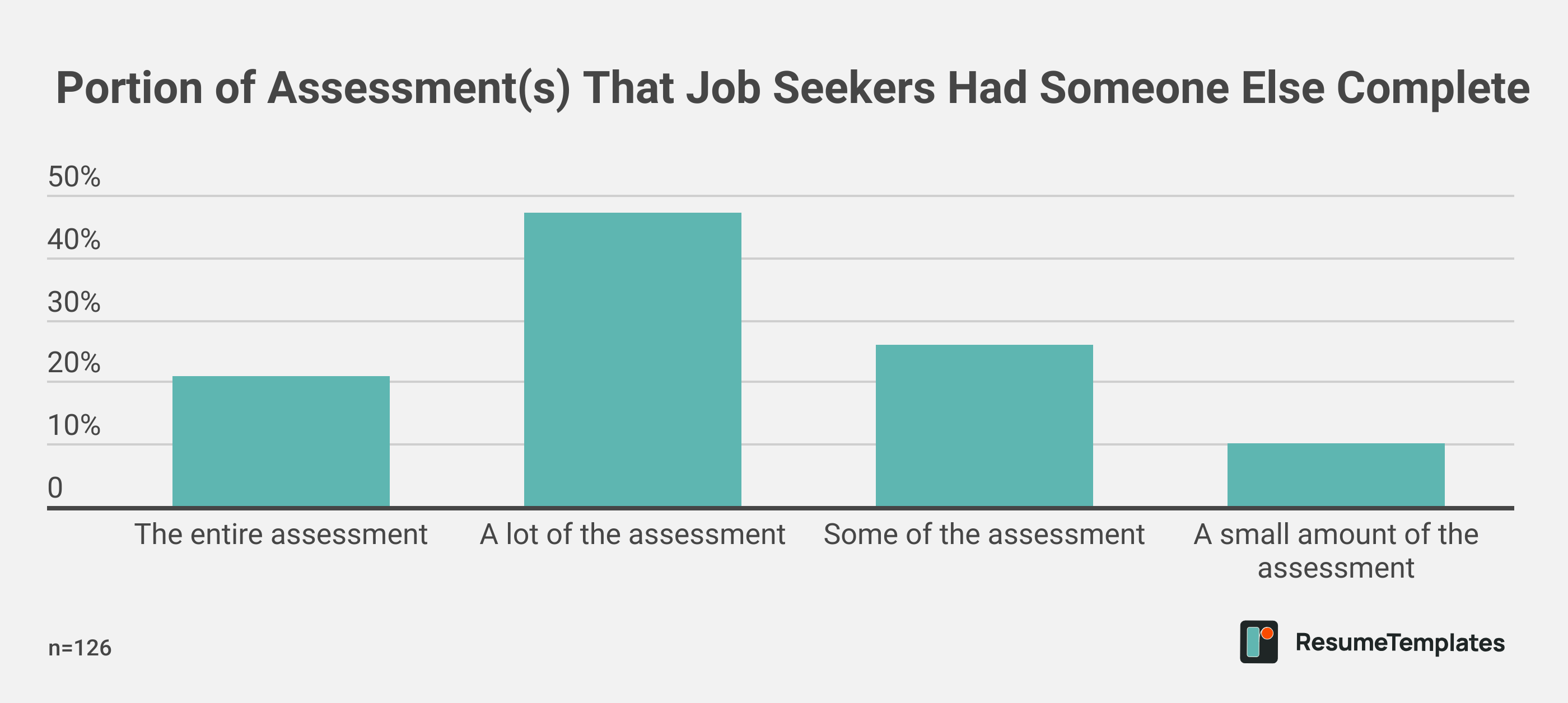
Gen Zers were more inclined to seek parental help, with 33% of them reporting that they turned to a parent for unauthorized help with their assessment. In contrast, 30% of millennials and 9% of Gen X respondents sought parental assistance.
Top reasons for cheating include anxiety, trusting someone else’s work over their own
Recent job seekers cheated on their assessments for a variety of reasons, including feeling anxious about the assessment (62%), thinking someone else could do it better (39%), not knowing how to complete it (32%), and simply feeling lazy (19%).
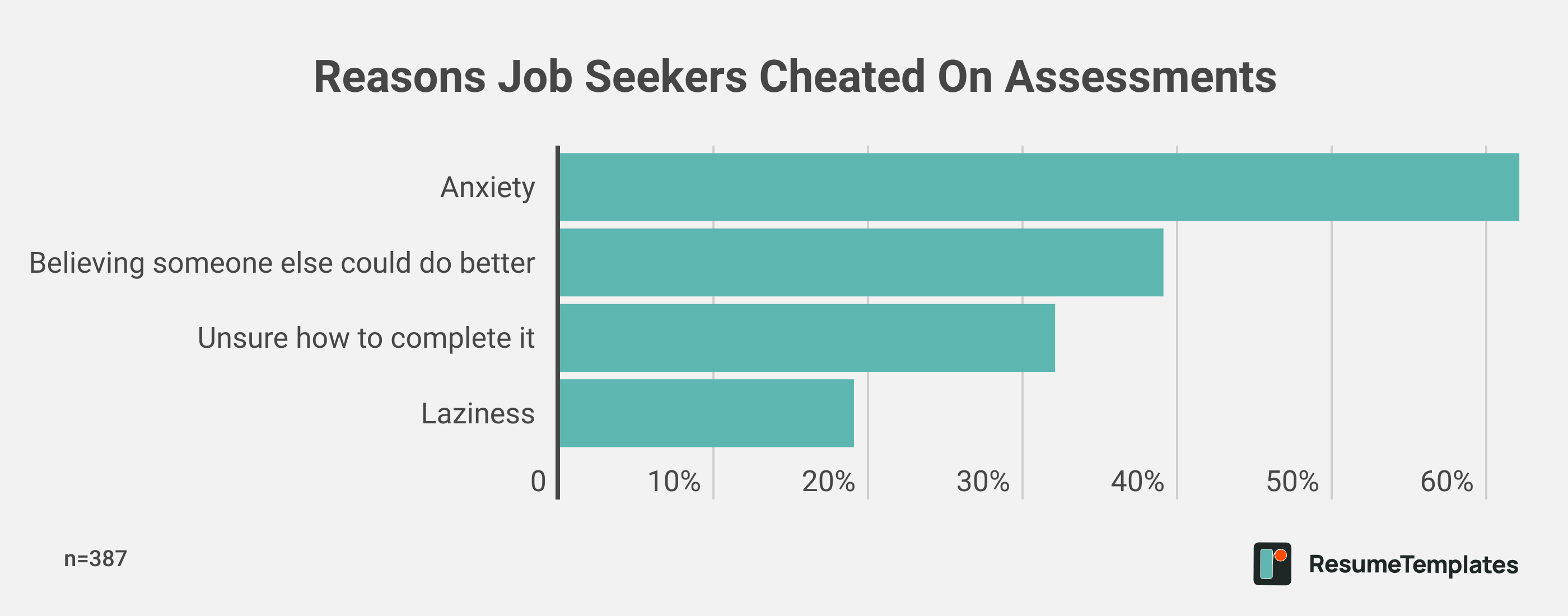
“Competition from high numbers of applicants – coupled with more virtual forms of interviewing – are two major reasons job seekers cheat during the hiring process,” explains Executive Resume Writer and Career Coach Andrew Stoner. “The proliferation of technological resources and the perceived low risk of being caught might be emboldening more applicants to take their chances.”
Over 1 in 10 Recent Job Seekers Cheated During Interviews
Recent job seekers report cheating across various interview formats. Specifically, 15% cheated during phone interviews, 13% during in-person interviews, and 11% during video interviews,
During video interviews, job seekers report receiving answers via text (44%), being fed answers from someone present during the virtual interview (44%), lying about their background or experience (63%), and having someone else complete the entire interview (15%). Job seekers received help from friends (58%), significant others (16%), mentors (40%), siblings (23%), and parents (15%).
Similarly, respondents cheated during phone interviews, lying about their background or experience (71%) being fed answers (33%), receiving answers via text (30%), and having someone else complete the full interview (20%). Friends (57%) were the primary source of assistance, followed by mentors (28%), significant others (27%), parents (18%), and siblings (15%).
Job seekers also cheated during in-person interviews, lying about their background and experiences (77%), receiving answers via text (31%), and having someone else complete the interview (23%). Friends (55%) were the most common source of help, along with significant others (30%), mentors (23%), siblings (17%), and parents (16%).

“A phone interview is one of the easiest opportunities for job seekers to cheat – whether they are being supplied with answers or having another person actually complete the entire interview,” explains Stoner. “My advice for employers to replace phone interviews with video interviews obviously adds a higher level of transparency and accountability to the process.”
Nearly 1 in 2 Gave a False Reference During Hiring Process
About half (46%) of recent job seekers say they’ve given a false reference during the hiring process.
Nearly half (46%) of those who gave a false reference did so because they believed it would yield better results, while 44% say they did not have a real reference. Additionally, 23% say their former boss does not have a favorable opinion of them.
“Based on this study, giving false references was one of the most frequent forms of cheating during the hiring process,” says Stoner. “Simply using LinkedIn or other employment verification tools to validate references could be an easy way for employers to identify applicants who are cheating.”
1 in 5 Lied on Their Resume
Among recent job seekers, 22% admit to fabricating information on their resumes, and 13% confess to lying on their cover letters.
These recent job seekers report lying about years of experience (54%), skills or abilities (50%), the duration of previous positions (39%), previous employers (38%), responsibilities at previous jobs (35%), professional achievements (30%), professional credentials or associations (24%), references (48%), and education (27%).
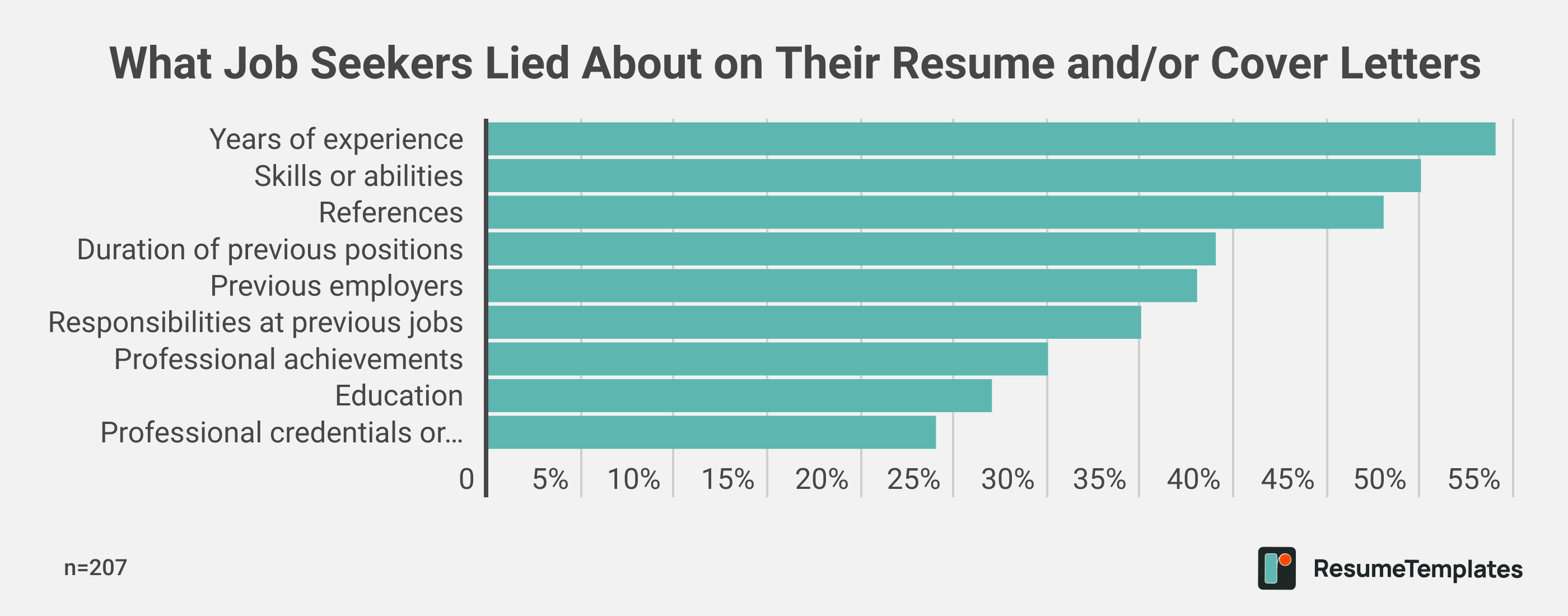
3 in 10 Cheaters Faced Professional Consequences
Of recent job seekers who lied or cheated during the hiring process, 31% report facing professional consequences, including having a job offer rescinded (17%), being reprimanded (13%), and getting fired (11%).
However, the vast majority (80%) of recent job seekers who cheated found a job.
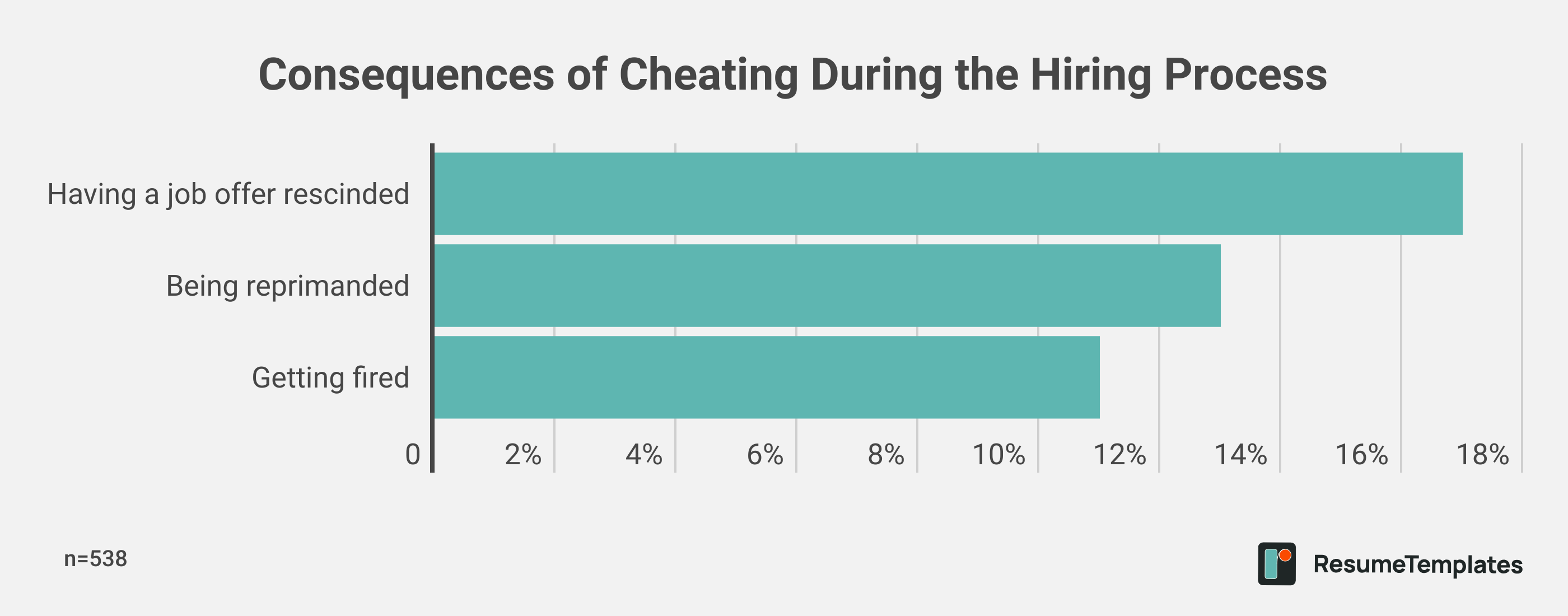
This survey was conducted in May 2024. In total, 1,759 U.S. respondents were surveyed, and 1250 respondents took the full survey. To take the full survey respondents had to answer that they searched for a job within the past two years.
Resume Templates offers free, HR approved resume templates to help you create a professional resume in minutes. Choose from several template options and even pre-populate a resume from your profile.